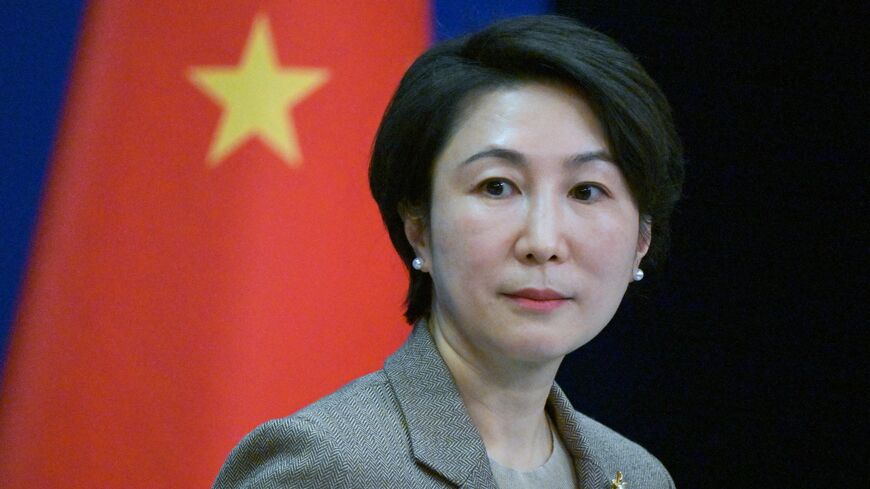Israel, China seek new accommodation as fissures grow over Gaza war
As Israel and China navigate shifting geopolitical realities and differences over Gaza, they will need to continually reassess the boundaries of their partnership balancing between confrontation and cooperation.

Since Hamas' Oct. 7 terror attack on Israel sparked a brutal war that continues to rage on, Israel-China relations seem to have gone off course.
For much of the past two decades, the People's Republic of China (PRC) largely managed to compartmentalize its relations with Israel and the Palestinians. Despite its ongoing political support of the Palestinians, China cultivated robust economic ties with Israel, becoming its third-largest trading partner and investing over $16 billion in Israeli tech and infrastructure projects. Israeli Prime Minister Benjamin Netanyahu even once described relations as a "marriage made in heaven."
But in late May, Israel's former health minister, Nitzan Horowitz, told the audience at Signal Group's eighth conference on Israel's China policy, "The whole balance of the relationship between the two countries [Israel and China] has changed." A day later, Prof. Fan Hongda from the Middle East Studies Institute of Shanghai International Studies University penned a piece titled "Israel-China relations: Caught in a downward spiral."
China’s language upsets Israel
Horowitz and Fan seemed to agree that China's messaging and conduct surrounding the Israel-Hamas war have catalyzed this shift in the Sino-Israeli relationship, with Fan referring to China's Foreign Ministry's Oct. 8 statement as "questionable."
That day, China's calls for "relevant parties to remain calm, exercise restraint, and immediately end the hostilities" while advocating for a two-state solution invoked shock and disappointment across Israeli society. Unlike the United States, Europe and others around the world, China failed to condemn Hamas explicitly for what has been called "the deadliest attack on Jews since the Holocaust." Meanwhile, Jerusalem interpreted Beijing's insistence on an immediate cease-fire as denying Israel's right to self-defense.
China's initial attempts to portray itself as neutral had failed. While China later reformulated its statement (following pressure from US officials), Prof. Fan believes "the damage was done."
Turn up the volume
Rather than embrace a more conciliatory tone, China has intensified its rhetoric: Wang Yi later described Israel's actions as "beyond self-defense" and called on Israel to stop the "collective punishment of the people of Gaza," while another Chinese official supported the "armed struggle" of the Palestinians at the International Court of Justice at The Hague. Tuvia Gering, from Israel's Institute for National Security Studies, tweeted that Wang's statements "felt like another twist of the knife in Israel's back."
A review of Chinese statements on Israel-Hamas wars since 2012 by analysts at the Washington Institute for Near East Policy observed this shift in Chinese messaging — concluding that this time around, "Beijing has been more direct in criticizing Israel's response to the Oct. 7 Hamas attack" than in previous conflicts.
Rampant antisemitism on China's censored social media, reports alleging that Chinese entities are funding pro-Palestinian and anti-American movements in the United States and the discovery of Chinese weapons in Gaza (likely not sourced directly from China) have done no favors to Beijing's popularity in Israel.
Israelis have been especially alarmed by China's vocal support for Israel's nemesis, Iran.
China condemned Israeli airstrikes on a building adjacent to the Iranian embassy in Damascus, which resulted in the death of Iranian Revolutionary Guard Corps (IRGC) commander Mohammad Reza Zahedi and at least six other IRGC soldiers; then, following an unprecedented attack by Iran directed toward Israeli soil, Chinese Foreign Minister Wang Yi praised Tehran for "handling the situation well … while safeguarding its sovereignty and dignity."
China has also conducted joint military drills with Russia and Iran in the Gulf of Oman and joined Moscow in vetoing a US Security Council resolution at the UN calling for an immediate cease-fire and condemning Hamas. These maneuvers have led many to believe that China is no friend of Israel's.
In fact, a survey conducted by the Institute for National Security Studies between May 16 and May 19, revealed that only 15% of Israelis would agree that China is a friend or ally. Around 54% of Israelis surveyed perceive China as unfriendly or hostile, while 31% reported they "don't know." Notably, just over a quarter of respondents reported a negative change in their perception of China since the outbreak of the Israel-Hamas war.
Taiwan visit
Israelis have not been shy about signaling their frustration.
In April, an Israeli parliamentary delegation visited Taiwan in what has been called "a show of warming ties with Taipei." Meanwhile, Israeli cyber experts have called on Israel to decrease reliance on China, and there has allegedly been talk of canceling Shanghai International Port Group's contract to operate a container terminal at the Haifa port.
Already in late October 2023, Israel joined 50 other countries in signing a joint statement at the United Nations condemning China's alleged human rights violations in Xinjiang, an issue Jerusalem almost never comments on. Meanwhile, Israeli pundits were writing, "China is increasingly hostile to Israel," "China was never Israel's friend" and "time for Israel to pivot away from Beijing."
More mature
As Israelis grapple with the dissonance surrounding the character of their relationship with China, Israel's former Mossad chief, Efraim Halevy, has called for Israelis to be "more mature."
According to Halevy, the Chinese have been more "circumspect in the way they have commented on the war" than many Israelis seem to appreciate. "And although on the face of it it would look like they [China] are immediately allied with our [Israel's] enemies," he said, "I do not think that in practical terms this has had any result in the field."
That's largely because, beyond political backing in international forums and some modest aid, China has provided little to no material support to the Palestinians or Hamas. Beijing's desire to ultimately maintain steady relations with Israel, coupled with an uncomfortable dependence on the US security umbrella to protect China's Middle East interests, deters it from offering such support.
Historically, this wasn't always the case. During the 1950s and '60s, China supported nationalist movements and governments from Algeria to the Persian Gulf — including the Palestine Liberation Organization. Seeking to rally comrades to join his united front against imperialism, Mao Zedong's China offered financial support, weapons and training. Beijing eventually recognized that involving itself in the region's internal affairs could ensnare China in disputes that diverge significantly from its core interests. Since then, it has pursued a "friends with all" approach.
A new accommodation
While you'd struggle to find an Israeli today who would call China a friend, the strategic importance of continued engagement with the world's second-largest economy is not lost on Israeli policymakers. China's growing economic and diplomatic influence in the Middle East simply cannot be ignored by Jerusalem.
While Israel's concerns surrounding China's comprehensive strategic partnership with Iran are not unfounded, Beijing's relationship with Tehran could also prove beneficial to Jerusalem. After all, China was instrumental in the negotiations that led to the Iran nuclear deal, and its role as a back channel for dialogue could one day help promote regional stability.
As Israel and China navigate shifting geopolitical realities, they will need to continually reassess the boundaries of their partnership. This evolving relationship will likely give rise to increasingly sophisticated forms of confrontation and cooperation.
Nonetheless, Israel's growing interests in the Indo-Pacific and China's expanding footprint in the Middle East compel the two to engage. It's not about sentiment. It's realpolitik.









